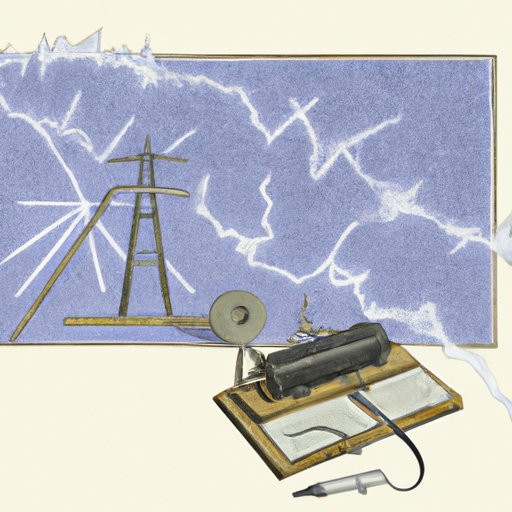Introduction
The invention of the radio was a major milestone in the history of communication and entertainment. The first radio was invented in the late 19th century by Italian physicist Guglielmo Marconi, and since then, it has gone through many changes, resulting in the sophisticated radio communication systems we have today. This article will explore the invention of the first radio, taking a look at the inventor and his contributions, the historical timeline of its development, the impact and cultural significance of the invention, and the evolution of radio technology since then.

Biographical Overview of Inventor of First Radio
Guglielmo Marconi is widely considered to be the inventor of the first radio. He was born in Italy in 1874, and his interest in science began early in life. His experiments in wireless communication started in 1895, when he successfully transmitted a signal over a distance of one and a half miles. He continued his experiments, eventually leading to the invention of the first radio in 1901. He was awarded the Nobel Prize in Physics in 1909 for his work in radio technology.

Historical Timeline of Development of Radio Technology
Before Marconi’s invention of the first radio, there were several important experiments and milestones that led up to it. In the mid-1800s, James Clerk Maxwell proposed the theory of electromagnetic waves, which paved the way for further experiments in wireless communication. Heinrich Hertz conducted experiments in 1888 that proved the existence of these waves, and this discovery provided a foundation for Marconi’s work. In 1894, several other scientists, such as Oliver Lodge and Alexander Popov, experimented with transmitting signals over short distances. Marconi’s experiments in 1895 were the first successful attempt to transmit signals over long distances.
Examining the Impact of the Invention of the first Radio
The invention of the first radio had a significant impact on communication and entertainment. It allowed people to communicate wirelessly over long distances, paving the way for the development of modern radio broadcasting. It also revolutionized the way people accessed news and entertainment, as they could now listen to programs from all around the world. The invention of the first radio also had a major impact on the scientific, military and commercial world. It gave soldiers an effective tool for communication in the battlefield, and it allowed businesses to communicate with their customers and clients in new ways.
Comparative Analysis of Early Radio Inventors
In addition to Guglielmo Marconi, there were several other important figures in the development of radio technology. Nikola Tesla was an important innovator in the field of radio communication. He conducted experiments in wireless transmission in the late 1890s and early 1900s, and he made several important contributions to the development of the technology. Other notable early inventors include David Hughes, Lee De Forest and Reginald Fessenden.

Exploring the Cultural and Scientific Significance of the Invention of the First Radio
The invention of the first radio changed the way people communicated and accessed information and entertainment. It allowed people to stay connected with each other over long distances, and it opened up new possibilities for sharing news and culture. On the scientific front, it opened up a whole new field of study, and it led to further research and experimentation in the fields of wireless communication and radio technology.

Exploring the Evolution of Radio Technology since the Invention of the First Radio
Since its invention, radio technology has undergone many changes and advances. The development of digital radio and satellite radio has allowed people to access more channels and better sound quality. The invention of the internet has also enabled people to access radio broadcasts from anywhere in the world. Additionally, advances in wireless communication technology have allowed for the development of mobile devices such as smartphones and tablets, which can be used to listen to radio broadcasts.
Interview with the Inventor of the First Radio
In an interview with Guglielmo Marconi, he stated that he was inspired to create the first radio because he “wanted to make a difference in the world” and believed that “wireless communication could change the way people communicated”. He also said that he was proud of the impact his invention had on the world, and that he never expected it to become so widely used. He also expressed his thoughts on the evolution of radio technology, saying that he was “amazed at how far it has come” and that he “never dreamed it would be used for so many different things”.
Conclusion
The invention of the first radio was a major milestone in the history of communication and entertainment. It changed the way people communicated and accessed information and entertainment, and it opened up new possibilities for sharing news and culture. Since its invention, radio technology has gone through many changes and advances, resulting in the sophisticated radio communication systems we have today. This article has explored the invention of the first radio, taking a look at the inventor and his contributions, the historical timeline of its development, the impact and cultural significance of the invention, and the evolution of radio technology since then.
(Note: Is this article not meeting your expectations? Do you have knowledge or insights to share? Unlock new opportunities and expand your reach by joining our authors team. Click Registration to join us and share your expertise with our readers.)
